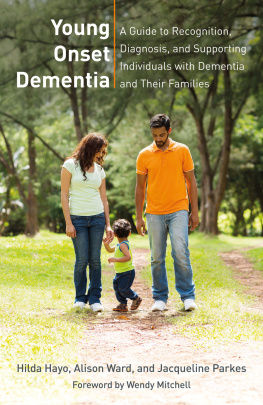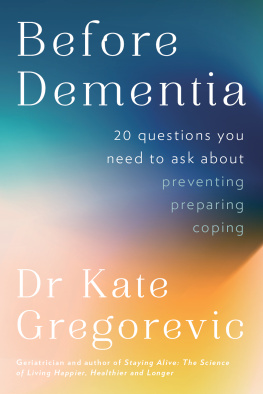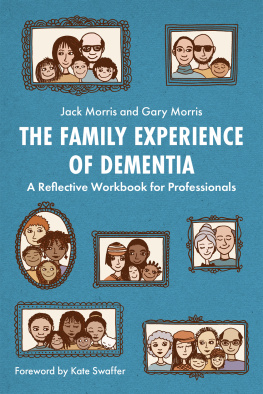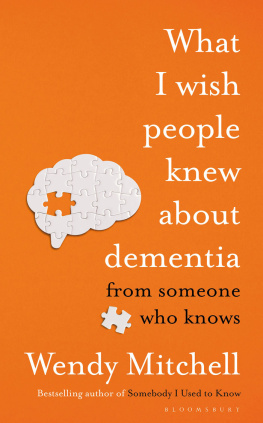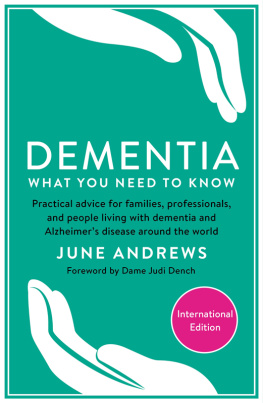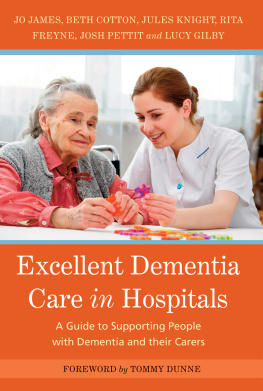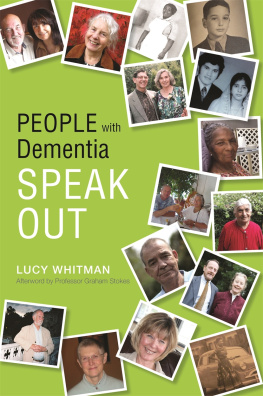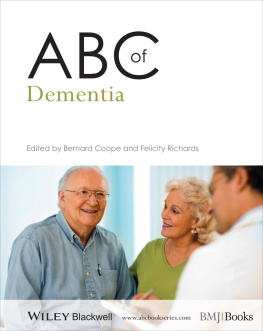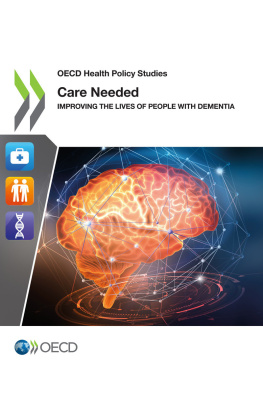
Young Onset
Dementia
A Guide to Recognition, Diagnosis, and Supporting Individuals with Dementia and Their Families
HILDA HAYO, ALISON WARD, and JACQUELINE PARKES
Foreword by WENDY MITCHELL

Jessica Kingsley Publishers
London and Philadelphia
Contents
Foreword
Those diagnosed with young onset dementia rarely fit the stereotypical image of someone with dementia. As someone who has gone through a process of diagnosis, abandonment, and being met by a lack of understanding from healthcare practitioners, it is refreshing to read a book dedicated to the unique challenges faced by those of working age. If dealt with appropriately and offered the right support needed by each individual, it can turn what is often a devastating diagnosis into something less fearful. Health and social care practitioners with the right knowledge and a positive outlook on support can give hope rather than despair, encouragement rather than finality. This book can give them that knowledge and understanding. It deals with the circumstances currently so often forgotten the effect on family relationships, loneliness and meaningful continuation of employment and activities.
People with dementia are always emphasising that when we get a diagnosis, so too do our family and friends. They too need support and education and I was pleased to read how family-centred care is truly at the heart of this book.
For those health and social care practitioners reading this book, it can give them knowledge and insight needed to deliver a richer and more positive message to people going through diagnosis and post-diagnosis. Dementia is a bummer of a diagnosis to get at any age, but for those diagnosed with young onset, with life plans still ahead of them, it can appear a bigger tragedy. Yet, if dealt with correctly by those at the very heart of our care, it can remove the feeling of the end and instead promote the beginning of a different life, certainly, but one of adapting and hopefully facing with less fear.
This book is essential reading for any health and social care practitioners involved in or interested in understanding the practical and emotional support needed by those with young onset dementia. Thank you to the authors for providing this much-needed resource.
Please feel free to read my blog on living with dementia: www.whichmeamitoday.wordpress.com, or follow me on Twitter: @WendyPMitchell.
Wendy Mitchell, author, blogger, and living with dementia
September 2017
Introduction
Receiving a formal diagnosis of dementia can be devastating at any age, but for people who are of working age it can have significant life-changing consequences for them and their families. As the person with dementia experiences progressive cognitive changes, they may decide to give up work. Their main family carer may need to work more flexibly, reduce their hours, or leave employment altogether to care for them. Family finances may come under pressure, preventing the family members being able to engage as actively as they once did in hobbies, interests, or social activities. Families, as well as the person with the diagnosis, can begin to feel socially isolated and lonely as it becomes increasingly more challenging to maintain an active and meaningful social life outside of the family home. The younger person with a diagnosis may feel increasingly frustrated as they feel their independence is being gradually eroded and they no longer feel they have a purpose in life. Faced with the behavioural, personality, and memory changes that their loved one is experiencing, family members may also experience a plethora of emotions. These may vary between being protective and wanting to keep them safe, through to embarrassment at their unpredictable behaviour in public, and resentment and guilt at seeing their relationship change and their future life plans together fade away.
For health and social care practitioners who work with young people with dementia, it is essential that they listen to the life stories of all involved in the journey, getting to know their likes, dislikes, interests, hobbies, knowledge, skills, existing mental capacities and capabilities, personal circumstances, fears, hopes, and aspirations. Planning the future together with the family will help them to learn to adapt and cope better with the diagnosis and ensure that they stay as independent, socially connected, and supported for as long as possible together at home. This book is designed for all health and social practitioners who work on a daily basis with people with young onset dementia and their families. It provides a greater understanding of what young onset dementia is, the types of dementia, and their impact on different aspects of family and individuals lives. This will be supported by case studies and quotes taken from people living with young onset dementia and their family to provide personal stories which exemplify the narrative of the book. These will sit alongside learning points and recommendations for service provision and how health and social care practitioners can provide best practice support. A resources section is included at the end of the book to assist with further learning and identification of service provision. Ultimately, it has been written to enhance the knowledge of those who support younger people with dementia so they can provide truly family centred care.
While dementia is considered to affect those in old age and to be a natural part of ageing, it can affect people under the age of 65 years. Conservative estimates indicate that approximately 42,000 people of working age could be living with a diagnosis of dementia in the UK; however, due to difficulties with diagnosis and reporting, this figure could be under-representative of the actual number of people living with the diagnosis (Alzheimers Society 2014). Dementia is often categorised as late onset dementia (over 65 years of age) and young onset dementia or working age dementia (under 65 years of age) (Bakker 2013; van Vliet et al. 2012). People with young onset dementia are typically in their 40s60s but rare cases have been found in young adulthood and in people aged in their 30s (Armari, Jarmolowicz and Panegyres 2013; Imrie, Jacklin and Mathieson 2008).
It is difficult to diagnose dementia in a younger person, particularly in the early stages of the disease, as the initial signs often differ from those observed in individuals with a later onset (van Vliet et al . 2012). There are also differences in the types of dementia diagnosed in the over and under 65 age groups (see ).
Table i.1 Most common types of dementia in the over 65 year group (Prince et al. 2014) and the under 65 year group (Rossor et al . 2010; YoungDementia UK 2017) |
Type of dementia | Proportion of different types of dementia (%) in the under 65 year age group | Proportion of different types of dementia (%) in the over 65 year age group |
Alzheimers disease | 34% | 62% |
Vascular dementia | 18% | 17% |
Mixed dementia | Figures not included in the study. | 10% |
Dementia with Lewy bodies | 7% | 4% |
Frontotemporal dementia | 12% | 2% |
Alcohol related brain impairment | 10% | Figures not included in the study. |
Other | 19% | 5% |
Next page
